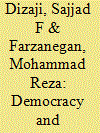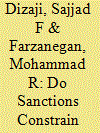| Srl | Item |
| 1 |
ID:
189400


|
|
|
|
|
| Summary/Abstract |
This study examines the dynamic relationship between democracy and the military in more than 40 developing countries from 1990 to 2017. We investigate the dynamic interaction between democracy and military institutions using a panel vector autoregressive model and impulse response functions as well as variance decomposition analyses. We show that democracy plays a significant role in the substitution of nonmilitary expenditures for defense expenditures. We also investigate the response of democracy to positive shocks in military and nonmilitary expenditures. We find that the responses of political systems and different indexes of democracy including electoral, liberal, participatory, deliberative, and egalitarian democracy to positive shocks in military expenditures are negative and significant, whereas their responses to the shocks in nonmilitary expenditures are not significant. This result suggests that the political behavior of governments in developing countries is influenced more heavily by their spending on the military sector than by their spending on the nonmilitary sector.
|
|
|
|
|
|
|
|
|
|
|
|
|
|
|
|
| 2 |
ID:
177832


|
|
|
|
|
| Summary/Abstract |
Do sanctions reduce military spending in Iran? To answer this question, we use annual data from 1960 to 2017 and the autoregressive distributed lag (ARDL) model. We show that an increase in the intensity of sanctions is associated with a larger decrease in military spending in both the short and the long run. Each level of increase in the intensity of sanctions with respect to our coding approach decreases military spending in the long run by approximately 33%, ceteris paribus. We also find that only the multilateral sanctions, in which the United States acts in conjunction with other countries to sanction Iran, have a statistically significant and negative impact on military spending of Iran in both the short and the long run. Multilateral sanctions reduce Iran’s military spending by approximately 77% in the long run, ceteris paribus. The results remain robust when controlling for other determinants of military spending such as gross domestic product (GDP), oil rents, trade openness, population, quality of political institutions, military expenditure of the Middle East region, non-military spending of government and the war period with Iraq.
|
|
|
|
|
|
|
|
|
|
|
|
|
|
|
|